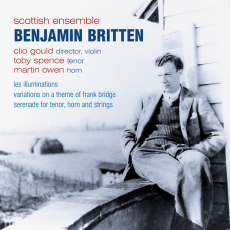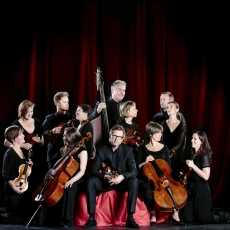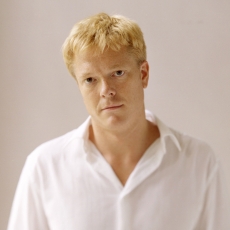Scottish Ensemble - Britten - International Record Review
The Scottish Ensemble, led for the past 12 years by Clio Gould, has long been one of Scotland's best kept secrets: a group of dedicated string players who are as much at home with contemporary music as the Baroque. Here it's the contemporary from the second half of the twentieth century, masterly early Britten with the Ensemble joined by a fine pair of soloists, both of whom are making their musical mark at home and abroad.
It is sometimes impossible to listen to either Les Illuminations or the Serenade for tenor, horn and strings without Peter Pears running through your head with that distinctive timbre in the upper register and his scrupulous attention to the text. How remarkable then that Toby Spence puts Pears to flight with such ease. From the first appearance of that dark and mysterious line in Les Illuminations, you know that Spence has found the psychological key to this work, that heady mix of anxiety and sensual, sometimes erotic excitement. And he has the technique to match. His glissandi at the end of 'Phrase' are ravishing and the intimate tone in 'Being beauteous' seduces the ear and the heart. This is surely Britten's greatest love-song and Spence finds his way into its deepest emotions. The Scottish Ensemble also brings its own particular musical insight to this great cycle of Rimbaud settings. It's not just Vienna you hear distinctly behind this music, but often Stravinsky, with 'Royaute' reminding you of Apollon musagete.
Spence and the Ensemble are equally impressive in the Serenade, where they are joined by Martin Owen, principal horn with the London Philharmonic Orchestra. In 'Elegy' horn and tenor vie for attention, with Owen passionate when 'the invisible worm that flies in the night...has found out thy bed of crimson joy' and Spence a cool and detached narrator of William Blake's personal vision of the Fall. It's less outwardly emotional than Robert Tear with Giulini or Anthony Rolfe Johnson with the Royal Scottish National Orchestra under Bryden Thompson, but just as effective. And not even Dennis Brain, who played at the first performance, nor the admirable David Pyatt, attempt the mounting hysteria in the horn part in 'Dirge'. Owen and Spence make this fifteenth-century anonymous version of the Day of Judgment into a terrifying Dies Irae.
Throughout both song-cycles the members of the Scottish Ensemble are well-matched partners, always alert to the delicate balance between themselves and the soloists and scrupulously exact in their reading of this music. It's the Variations on a theme of Frank Bridge that gives them their chance to shine. And how they glitter! This is clean and clear string playing with real edge to its attack. The balance too is carefully conceived, with the contrast between the dark lower strings and the yearning line for the violin in, say, 'Adagio' particularly effective. And that curdled little waltz in 'Wiener Waltzer' - a tongue-in-cheek homage to Mahler and Berg is utterly beguiling. The secret is out: the Scottish Ensemble is one Britain's finest string bands - and the pun is intended.


